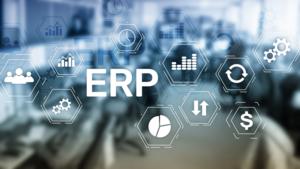ERP for growing businesses is no longer a luxury or a long-term project. It is a critical decision that shapes how a business scales, collaborates and stays competitive. As companies grow in size and complexity, disconnected tools and legacy systems begin to create bottlenecks. Visibility becomes limited. Processes start to break down. And at some point, leaders realise they need one system to bring everything together.
That system is ERP – Enterprise Resource Planning. But the question facing most businesses today is not whether they need it, it is which kind. The two most common options are cloud ERP and on-premise ERP. Both can support growth, but they come with different costs, trade-offs and long-term implications.
At Evolution, we work with ambitious businesses to guide them through this decision. We take a practical, business-first approach to ERP for growing businesses and here’s how we help clients think it through.
Understanding ERP for Growing Businesses
Before comparing solutions, it helps to understand what ERP really means in the context of a growing organisation. ERP is the system that connects your operations. It brings together finance, inventory, procurement, HR, compliance, customer data and more into one shared environment.
That kind of integration can be transformative. But only if the ERP solution is fit for purpose. Many businesses we speak to are still relying on outdated software, spreadsheets and tools that have been patched together over time. It might have worked when the team was small, but as customer demand increases and teams expand, the cracks begin to show.
ERP for growing businesses is about future-proofing. It is about building a system that supports the way your team works now, but also where your business is heading next.
Cloud ERP for Growing Businesses
Cloud ERP is hosted online by the vendor and delivered via a subscription model. It is one of the most popular choices for small and mid-sized businesses and for good reason.
Advantages of cloud ERP:

- Lower upfront costs: There is no need for servers, on-site infrastructure or big capital outlays. You pay monthly or annually and the provider takes care of everything else.
- Faster implementation: Cloud solutions can often be live in a matter of weeks, not months.
- Scalability: As your business grows, cloud ERP grows with you. Adding users, storage or new functionality is straightforward.
- Automatic updates: Your system stays current with the latest features, patches and security enhancements without internal effort.
- Remote access: Teams can access data securely from any location with internet access, which supports hybrid and remote working.
- Reduced IT burden: With hosting and system maintenance handled by the vendor, internal IT teams are free to focus on value-added work.
For most growing businesses without significant internal IT infrastructure, cloud ERP offers a flexible, scalable and cost-effective way to unify systems and support growth.
On-Premise ERP for Growing Businesses
On-premise ERP is installed locally and managed by the business’s internal or external IT support. It requires physical infrastructure, licensing and a higher degree of in-house oversight. While it is less common among small to mid-sized companies, it still has its place especially in highly regulated industries or organisations with complex existing infrastructure.
Advantages of on-premise ERP:
- Full control: You decide when to update, how to customise and where to store your data.
- Customisation flexibility: On-premise systems can often be tailored more deeply to reflect unique workflows and industry requirements.
- Data residency: For industries with strict data sovereignty requirements, having full control of where data is stored may be essential.
- Integration with legacy systems: If you already rely on older platforms that are not cloud-ready, on-premise ERP may be easier to integrate.
However, on-premise ERP also comes with significant demands. It requires higher upfront investment, longer deployment timelines and a capable IT team to manage updates, security, backups and disaster recovery.
Making the Right Choice
There is no universal answer to whether cloud or on-premise ERP is better. At Evolution, we believe in making the right choice based on business need, not technical trend.
When we support clients in evaluating ERP for growing businesses, we look at a few key areas:
- Regulatory and compliance environment: Are there legal or industry obligations that require local data storage?
- Cash flow and capital availability: Would subscription-based pricing support your financial strategy better than a large one-off investment?
- IT resources: Do you have a strong internal IT team or would you benefit from a hosted solution?
- Customisation needs: Are your processes standard or highly tailored?
- Scalability: Are you expecting rapid growth or seasonal fluctuations in demand?
- Remote working and collaboration: How important is flexible access for your teams?
These questions help uncover the practical realities of how each system would operate within your business.
ERP for Growing Businesses Needs to Be Led by Strategy
One of the biggest mistakes we see is treating ERP selection as a technology decision rather than a strategic one. ERP is not just about streamlining finance or automating reporting. It influences how you serve customers, how you scale operations, how you measure success and how quickly your teams can respond to change.
That is why our approach to ERP for growing businesses is grounded in consultancy. We start with where you are, where you want to go and what is getting in the way. From there, we help you build a system that not only supports your current operations but gives you room to grow with confidence.
Get the Right ERP Strategy in Place
If you are thinking about investing in ERP or want to understand whether your current system is still fit for purpose, Evolution can help. From initial review to system selection, implementation and ongoing support, we work with growing businesses to make sure their tech is aligned with their ambition.
ERP for growing businesses should be about more than just functionality. It should be a platform for growth, clarity and smarter decisions.
Let’s make sure yours is working the way it should. Get in touch with the team today


